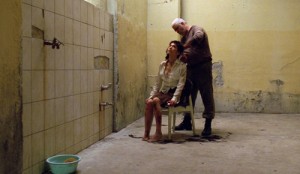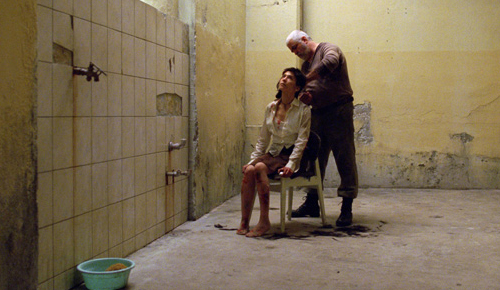Directed by Denis Villeneuve
Written by Denis Villeneuve and Valérie Beaugrand-Champagne
Canada/France, 2010, 130 mins.
Spoilers are contained herein.
Incendies is the first unqualified masterpiece of 2011 and the film that should have won the Best Foreign Language Film Award at this year’s Academy Awards. Denis Villeneuve’s film is a perfect adaptation of the wonderful Canadian play by Wajdi Mouawad, a plat that might be the best family drama of the past decade. Villeneuve and his co-writer Valérie Beaugrand-Champagne strip away an hour out of the play’s running time while still staying faithful to the play’s structure. What makes the film really work is that it is an intimate family drama set on a global scale that plays out as an engaging and tense thriller. This is the film that Susanne Bier’s film In a Better World tried so hard and failed to be.
The film’s action hops back and forth between the past and the present, Montreal and an unnamed country in the Middle East that resembles Lebanon. Incendies features one of the most haunting opening sequences in any film of recent years, showing a child soldier having his hair  shaved, set to Radiohead’s “You and Whose Army.” In Montreal sometime later, Simon (Maxim Gaudette) and Jeanne Marwan (Mélissa Désormeaux-Poulin) are going through their mother’s will with notary Jean Lebel (Remy Girard). It appears that their mother has left them a note saying that they need to travel back to find their brother and father, who may still be alive. She wants them to unravel the mystery of who they really are. Simon wants nothing to do with this, but Jeanne insists, and travels to their mother’s homeland. Once she arrives, the film takes on a structure of switching between their mother Nawal’s (Lubna Azabel) past and Jeanne’s search, where she uncovers things she previously didn’t know about Nawal, including the fact that in 1970 she gave birth and was sent away to live with her uncle to attend college. Nawal, a Christian, joined the resistance as an assassin, and eventually kills the leader of the oppressive dictatorship that stands in for the events of Lebanese Civil War of the 1970s.
shaved, set to Radiohead’s “You and Whose Army.” In Montreal sometime later, Simon (Maxim Gaudette) and Jeanne Marwan (Mélissa Désormeaux-Poulin) are going through their mother’s will with notary Jean Lebel (Remy Girard). It appears that their mother has left them a note saying that they need to travel back to find their brother and father, who may still be alive. She wants them to unravel the mystery of who they really are. Simon wants nothing to do with this, but Jeanne insists, and travels to their mother’s homeland. Once she arrives, the film takes on a structure of switching between their mother Nawal’s (Lubna Azabel) past and Jeanne’s search, where she uncovers things she previously didn’t know about Nawal, including the fact that in 1970 she gave birth and was sent away to live with her uncle to attend college. Nawal, a Christian, joined the resistance as an assassin, and eventually kills the leader of the oppressive dictatorship that stands in for the events of Lebanese Civil War of the 1970s.
There is a wonderful scene early on where Nawal attempts to retireve her estranged son only to find that the building that he lived in is burnt to the ground. She sees a bus coming and quickly realizes that it is full of Muslims trying to escape Christian rule. She ends up improvising by taking her cross off and wrapping her scarf around her head to signal she is Muslim. It works, but the bus is eventually pulled over by a bunch of soldiers and shot at. Now she realizes that the only thing that will save her life is to reveal that she is a Christian. Again, she survives, and she tries to pass on a Muslim child as her own but he is ultimately killed. The whole sequence is beautifully filmed and horrifying at the same time. Azabel’s expression as she sees the little boy gets shot is all we need to know that she is now forever changed. We do not question her willingness to change sides.
 Villeneuve isn’t afraid to confuse us once the flashbacks start. For the first thirty minutes, the film is incredibly disorientating because Nawal and Jeanne look alike. Villeneuve is very careful to have them dressed similarly and they both wear the same Cross necklace. Another thing that makes it slightly disorientating is that at first the “flashbacks” don;t seem to be too far in the past. However as the scenes play out, we realize that this is indeed the 1970s.
Villeneuve isn’t afraid to confuse us once the flashbacks start. For the first thirty minutes, the film is incredibly disorientating because Nawal and Jeanne look alike. Villeneuve is very careful to have them dressed similarly and they both wear the same Cross necklace. Another thing that makes it slightly disorientating is that at first the “flashbacks” don;t seem to be too far in the past. However as the scenes play out, we realize that this is indeed the 1970s.
Unlike many films dealing with similar subject matter, the film does not exploit these events to tell a personal story of Westerners coming in to discover injustice, as indicated by the significant portion of the running time devoted to the 1970s segments. We aren’t seeing the past through Jeanne’s eyes, but rather through Nawal’s eyes. While there are scenes of intense violence, they are necessary and Villeneuve’s camera doesn’t linger too long on wounds or injuries.
What makes the film so powerful is the family drama that is at the core of this story. Ultimately, we all think we know our parents better than we actually do. What is eventually revealed about Simon and Jeanne’s father is shocking but not unbelievable. The performances in Incendies are all incredible, starting with Nawal, played Lubna Azabal, an actress who can’t be older than 30. Azabel plays Nawal from 20 to around 50 or 60 and is believable throughout. She doesn’t go for the typical grandstanding that could have come with the role, but instead gives a quietly fierce performance. Mélissa Désormeaux-Poulin is equally as good as Jeanne, who react believably to the events around her. Maxim Gaudette as Simon brings a tenderness to the searing anger underneath his character’s skin. And while he only has two scenes, Abdelghafour Elaaziz is heartbreaking as the troubled Abou Tarek.
Incendies is an incredible film with a very simple message: we need to forgive no matter how terrible a tragedy we undergo. This is the message that Nawal ultimately passes on to her kids. It’s no surprise that this film takes place in an unnamed country in the middle-east. Maybe that is what we all have to do.
Josh Youngerman


